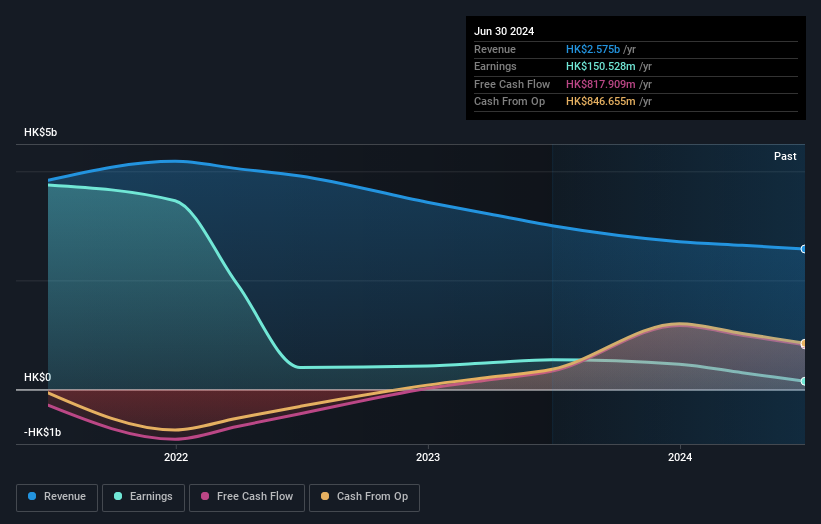- Hong Kong
- /
- Diversified Financial
- /
- SEHK:818
Hi Sun Technology (China) Limited's (HKG:818) last week's 10% decline must have disappointed individual investors who have a significant stake

Key Insights
- Hi Sun Technology (China)'s significant individual investors ownership suggests that the key decisions are influenced by shareholders from the larger public
- A total of 17 investors have a majority stake in the company with 45% ownership
- Insider ownership in Hi Sun Technology (China) is 37%
A look at the shareholders of Hi Sun Technology (China) Limited (HKG:818) can tell us which group is most powerful. We can see that individual investors own the lion's share in the company with 55% ownership. In other words, the group stands to gain the most (or lose the most) from their investment into the company.
Following a 10% decrease in the stock price last week, individual investors suffered the most losses, but insiders who own 37% stock also took a hit.
Let's delve deeper into each type of owner of Hi Sun Technology (China), beginning with the chart below.
Check out our latest analysis for Hi Sun Technology (China)

What Does The Institutional Ownership Tell Us About Hi Sun Technology (China)?
Institutional investors commonly compare their own returns to the returns of a commonly followed index. So they generally do consider buying larger companies that are included in the relevant benchmark index.
Hi Sun Technology (China) already has institutions on the share registry. Indeed, they own a respectable stake in the company. This suggests some credibility amongst professional investors. But we can't rely on that fact alone since institutions make bad investments sometimes, just like everyone does. If multiple institutions change their view on a stock at the same time, you could see the share price drop fast. It's therefore worth looking at Hi Sun Technology (China)'s earnings history below. Of course, the future is what really matters.

We note that hedge funds don't have a meaningful investment in Hi Sun Technology (China). The company's CEO Man Chun Kui is the largest shareholder with 23% of shares outstanding. Meanwhile, the second and third largest shareholders, hold 12% and 7.1%, of the shares outstanding, respectively.
A deeper look at our ownership data shows that the top 17 shareholders collectively hold less than half of the register, suggesting a large group of small holders where no single shareholder has a majority.
Researching institutional ownership is a good way to gauge and filter a stock's expected performance. The same can be achieved by studying analyst sentiments. As far as we can tell there isn't analyst coverage of the company, so it is probably flying under the radar.
Insider Ownership Of Hi Sun Technology (China)
The definition of company insiders can be subjective and does vary between jurisdictions. Our data reflects individual insiders, capturing board members at the very least. The company management answer to the board and the latter should represent the interests of shareholders. Notably, sometimes top-level managers are on the board themselves.
Insider ownership is positive when it signals leadership are thinking like the true owners of the company. However, high insider ownership can also give immense power to a small group within the company. This can be negative in some circumstances.
Our most recent data indicates that insiders own a reasonable proportion of Hi Sun Technology (China) Limited. It has a market capitalization of just HK$1.0b, and insiders have HK$374m worth of shares in their own names. We would say this shows alignment with shareholders, but it is worth noting that the company is still quite small; some insiders may have founded the business. You can click here to see if those insiders have been buying or selling.
General Public Ownership
The general public, mostly comprising of individual investors, collectively holds 55% of Hi Sun Technology (China) shares. With this amount of ownership, retail investors can collectively play a role in decisions that affect shareholder returns, such as dividend policies and the appointment of directors. They can also exercise the power to vote on acquisitions or mergers that may not improve profitability.
Next Steps:
While it is well worth considering the different groups that own a company, there are other factors that are even more important. Case in point: We've spotted 3 warning signs for Hi Sun Technology (China) you should be aware of, and 1 of them can't be ignored.
If you would prefer check out another company -- one with potentially superior financials -- then do not miss this free list of interesting companies, backed by strong financial data.
NB: Figures in this article are calculated using data from the last twelve months, which refer to the 12-month period ending on the last date of the month the financial statement is dated. This may not be consistent with full year annual report figures.
Valuation is complex, but we're here to simplify it.
Discover if Hi Sun Technology (China) might be undervalued or overvalued with our detailed analysis, featuring fair value estimates, potential risks, dividends, insider trades, and its financial condition.
Access Free AnalysisHave feedback on this article? Concerned about the content? Get in touch with us directly. Alternatively, email editorial-team (at) simplywallst.com.
This article by Simply Wall St is general in nature. We provide commentary based on historical data and analyst forecasts only using an unbiased methodology and our articles are not intended to be financial advice. It does not constitute a recommendation to buy or sell any stock, and does not take account of your objectives, or your financial situation. We aim to bring you long-term focused analysis driven by fundamental data. Note that our analysis may not factor in the latest price-sensitive company announcements or qualitative material. Simply Wall St has no position in any stocks mentioned.
About SEHK:818
Hi Sun Technology (China)
An investment holding company, payment and digital services, fintech services, platform operation solutions and financial solutions in Hong Kong and internationally.
Good value with mediocre balance sheet.
Market Insights
Community Narratives



